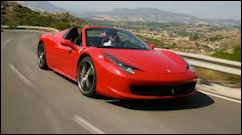by James A. Bacon
Alvin and Heidi Toffler once wrote about the mismatch in speeds at which private corporations and governments evolve in response to social, economic and technological change. Nowhere is that differential more obvious than the automobile sector. The automobile industry is a Ferrari blazing down the Interstate at 120 miles per hour while government is an old jalopy loaded up with chicken cages, poking along at 30 m.p.h.
I’ve written about the onrushing era of self-driving vehicles. The technology is within grasp. Auto manufacturers are eager to build the cars. There will be millions of willing buyers. Whether the American legal system can work out a way to allocate liabilities in the event of accidents is another question entirely. (See Holman Jenkins’ latest column in the Wall Street Journal to see how prickly this will be.)
Meanwhile, an auto revolution of an entirely different sort is now upon us, as I detailed in the preceding blog post, “Coming up: Car-Lite Burbs.” We have seen inklings of this revolution with the likes of ZipCar, Lyft, Uber, Bridj, RelayRides and other start-ups that link drivers and riders through the Internet and smart phones. Those services thrive mainly in dense urban locations. What’s so startling about the Daimler AG-Rancho Mission Viejo venture in Orange County is that it effectively rolls up the concepts of all those start-ups and packages them as a subscriber service. In the suburbs.
The first phase of that program rolls out in July. Residents of the Ladera community will have access to scooters, buses, shuttle vans, car-pooled cars and about every other ride-sharing arrangement imaginable. The goal isn’t to replace all cars in the community, it’s to make it feasible for homeowners to reduce the number from three to two, or from two to one. While the venture hasn’t divulged details of its pricing packages, backers aim to provide the service at half the cost of owning a car.
Nobody knows if this particular experiment will prove financially viable. Can Daimler-Rancho Mission Viejo provide the service at sufficiently low cost to induce Californians to give up one or more of their cars? If so, will that price cover the cost of providing the service? Expect a lot of tinkering and a lot more experimentation before people figure out how to make the idea profitable. But the tinkering and experimentation will take place. Daimler might be the first out of the gate with with a transportation-as-a-service product but the marketplace is a seething pool of innovation. The transportation industry will be radically disrupted.
Meanwhile, here in Virginia, we’re pretty much stuck on the same old argument — should the government spend more on roads and highways or spend more on mass transit? Even questions that I was asking a year ago — how can we prioritize projects on a Return on Investment basis — are looking shop-worn and irrelevant. The question we should be asking now is this: With all the innovation in the marketplace, do we have the faintest idea how the transportation sector will be organized five or 10 years from now? Do we have the faintest idea of what the demand will be for either roads or mass transit? Any honest answer is, “No, we don’t.”
But that won’t stop us from spending billions and billions of dollars to fix yesterday’s problems. It should escape no one’s notice that Virginia has tumbled to the No. 8 spot in CNBC’s eighth annual listing of America’s Top States for Business — a humbling come-down since we scored No. 1 in 2007, 2009 and 2011. We won’t climb our way back to the top by blindly throwing money at transportation projects conceived in a different era when the technology and economics of transportation were totally different than they will be five years from now. Please, Virginia, open your eyes and see what’s happening in the world around you. We resist change, and we fall further and further behind.




